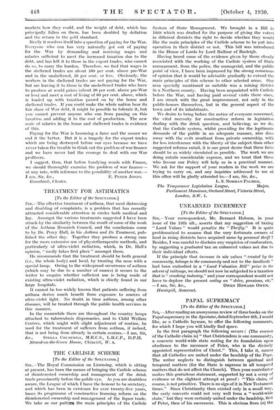THE CARLISLE SCHEME
[To the Editor of the SPECTATOR.]
Sin,—The Royal Commission on Licensing, which is sitting at present, has been the means of bringing the Carlisle scheme of disinterested ownership and management of the drink trade prominently before the public eye. As you are doubtless aware, the League of which I have the honour to be secretary, and which has been in existence for over twenty-five years, bases. its programme of constructive licensing reform on the disinterested ownership and management of the liquor trade. We take as our pattern the main principles of the Carlisle
System of State Management. We brought in a Bill in 1928 which was drafted for the purpose of giving the voters in different districts the right to decide whether they would like the main principles of the Carlisle scheme to be put into operation in their district or not. This bill was introduced in the House of Lords by Lord Balfour of Burleigh.
Having heard some of the evidence given by those closely associated with the working of the Carlisle system of State management, from the police, the managerial, and the public point of view, I have been impressed by the strong consensus of opinion that it would be advisable gradually to extend the main principles of this scheme to other selected areas. One area specially mentioned as suitable was a mining district in a Northern county. Having been acquainted with Carlisle before the War, and having paid several visits there since, I am struck with the great improvement, not only in the public-houses themselves, but in the general aspect of the town and of its inhabitants.
We desire to bring before the notice of everyone concerned, the vital necessity for constructive reform in legislation dealing with the drink question, and believing, as we do, that the Carlisle system, whilst providing for the legitimate demands of the public in an adequate manner, also does away with the evils resultant from private ownership, with far less interference with the liberty of the subject than other suggested reforms entail, it is our great desire that these facts should be as widely circulated as possible. The work we are doing entails considerable expense, and we trust that those who favour our Policy will help us in a practical manner. We ask for the support of your readers in the work we are trying to carry on, and any inquiries addressed to me at this office will be gladly attended to.—I am, Sir, &c., L. S. NORMAN PALMER,
The Temperance Legislation League, Major. Parliament Mansions, Orchard Street, Victoria Street, London, S.W. 1.




















































 Previous page
Previous page